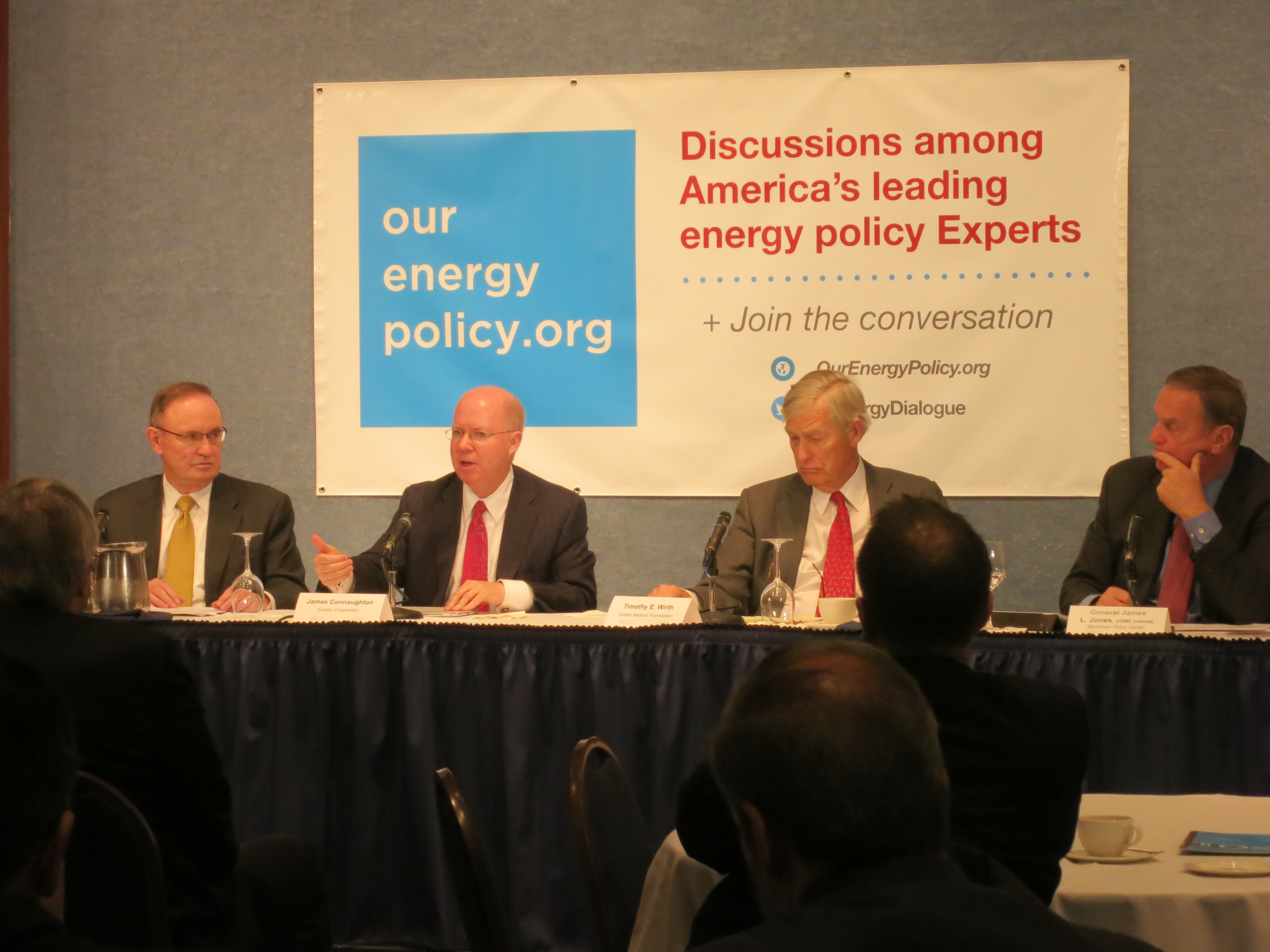15 item(s) were returned.
Professor of Public Policy
Georgia Institute of Technology
City skylines have long been a symbol of innovation and prosperity. What you can’t see is that these same buildings are some of the largest energy consumers in the United States and are therefore responsible for significant amounts of the nation’s carbon pollution. In August 2015, President Obama and the U.S. Environmental Protection Agency released the final Clean Power Plan, regulating carbon pollution from existing power plants for the first time. Since then, many cities have released Climate Action Plans, setting targets for carbon emissions. The success of these two initiatives are mutually dependent. EPA’s Clean Power Plan requires strong… [more]
View InsightUpdate: See a video recording of the event here OurEneryPolicy.org’s high-level panel discussion, moderated by Chief National Correspondent for the Fox News Channel Jim Angle, and featuring James Connaughton, General James L. Jones, and Timothy Wirth, had an overall tone of optimism for energy policy for next four years and beyond. Here are some event highlights: The panelists saw hydraulic fracturing as presenting an economic, energy security, and emissions reduction opportunity, but agreed that smaller “mom and pop” operations engaging in substandard industry practices could turn public opinion against fracking. However, there is an opportunity for industry leaders, such as… [more]
View InsightA new U.S. Environmental Protection Agency mandate under the Renewable Fuel Standard will require a minimum four-gallon purchase of the E10 ethanol-gasoline blend at service station pumps selling both E10 and E15 fuel from the same hose. E15 is an 85% gasoline, 15% ethanol fuel blend, and has only been approved for use in vehicles manufactured after 2001. Roughly two-thirds of gasoline pumps in U.S. gas stations use one hose to dispense different blends of fuel. This has lead to concerns that residual E15 could end up in the engines of vehicles not designed to run on the higher blend, such… [more]
View InsightThe Environmental Protection Agency (EPA) and the National Highway Transport Safety Administration (NHTSA) have released new rules for a corporate average fuel economy (CAFE) standard that will increase fuel economy to the equivalent of 54.5 miles per gallon and reduce vehicle greenhouse gas emissions to 163 grams of carbon dioxide per mile by 2025. The EPA is establishing national GHG emissions standards under the Clean Air Act, and the NHTSA is establishing Corporate Average Fuel Economy (CAFE) standards under the Energy Policy and Conservation Act. Both programs will give flexibility to manufacturers to achieve compliance, including the use of a credit… [more]
View InsightDescribing recently implemented or approved regulations – including the Greenhouse Gas New Source Performance Standard, the Utility MACT standards, and the Cross-State Air Pollution Rule – and their deep impacts on the coal industry, a report from the Heritage Foundation calls on Congress “to create a framework that restricts overregulation, empowers the states, balances economic growth and environmental well-being, and creates a timely permitting process for all aspects of coal production.” The report finds no issue with the free market changing coal’s share of our energy mix, but argues against artificially reducing that share through disincentives and regulation. The report states that… [more]
View InsightOn Thursday, June 14th the bipartisan House Oil & National Security Caucus — co-chaired by Rep. Jack Kingston (R-GA) and Rep. Eliot Engel (D-NY) — and OurEnergyPolicy.org hosted a fantastic panel discussion called Gas Prices & National Security. The panelists included former Director of Central Intelligence R. James Woolsey, American Enterprise Institute scholar Kenneth P. Green, and Bloomberg Government energy analyst Rob Barnett. What do you make of the panelists arguments? What is the relationship between gasoline prices and national security? Are national security concerns sufficient grounds to rewire America’s liquid fuels infrastructure?
View InsightBloomberg Government has published The Twilight of Coal Power?, an assessment of how EPA’s new greenhouse gas rules might affect coal-fired power plants. The report concludes that although coal will remain in the energy mix for decades due to existing plants, the EPA’s new rule will effectively ban new coal plants. The new rules require that fossil plants not exceed 1,000 lbs. of CO2/MWh. Scott Segal, executive director of the Electric Reliability Coordinating Council, which represents utility interests, warns that EPA’s rule will disrupt utility hedging by eliminating coal from the fuel mix and “depriving the market of its flexibility.”… [more]
View InsightIn an April 26th speech to business leaders at the U.S. Chamber of Commerce, Nick Akins, President and CEO of American Electric Power, urged the U.S. to develop a comprehensive energy policy. Akins explained that a recent “perfect storm of circumstances” – including EPA regulations, diminished reliance on nuclear power, and low natural gas prices – are making natural gas the de facto favored fuel for power generation. This is a concern for Akins, who points out that natural gas prices have been volatile historically, and that relying on a single fuel source for power generation is risky. [Columbia Dispatch]… [more]
View InsightIn 2007, US EPA began using renewable identification numbers (RINs) to track fuel producer compliance with the Energy Policy Act of 2005’s Renewable Fuel Standard (RFS), which calls for fuel blends to contain a minimum amount of renewable fuels. RINs quantify the biofuel, produced or imported, used in fuel blends. Fuel producers buy and sell them, and then submit them to demonstrate compliance. The complexity of RIN markets and RFS compliance has come under scrutiny lately, as several instances of fraud have emerged. In 2010, two small biofuel producers – Clean Green Fuel and Absolute Fuels – started selling fraudulent… [more]
View InsightOn March 27, 2012 the Environmental Protection Agency, under the authority of the Clean Air Act, released proposed greenhouse gas standards for newly constructed power plants. The rules would require that “new fossil‐fuel‐fired power plants meet an output‐based standard of 1,000 pounds of CO2 per megawatt‐hour (lb CO2/MWh gross).” Combined-cycle natural gas plants should be able to meet this requirement, and coal- or petroleum coke-fired plants would be able to with emerging technologies such as carbon capture and storage. The proposed rules elicited varied response from advocacy groups, many of which were highlighted in this Los Angeles Times article. Environmental… [more]
View Insight



